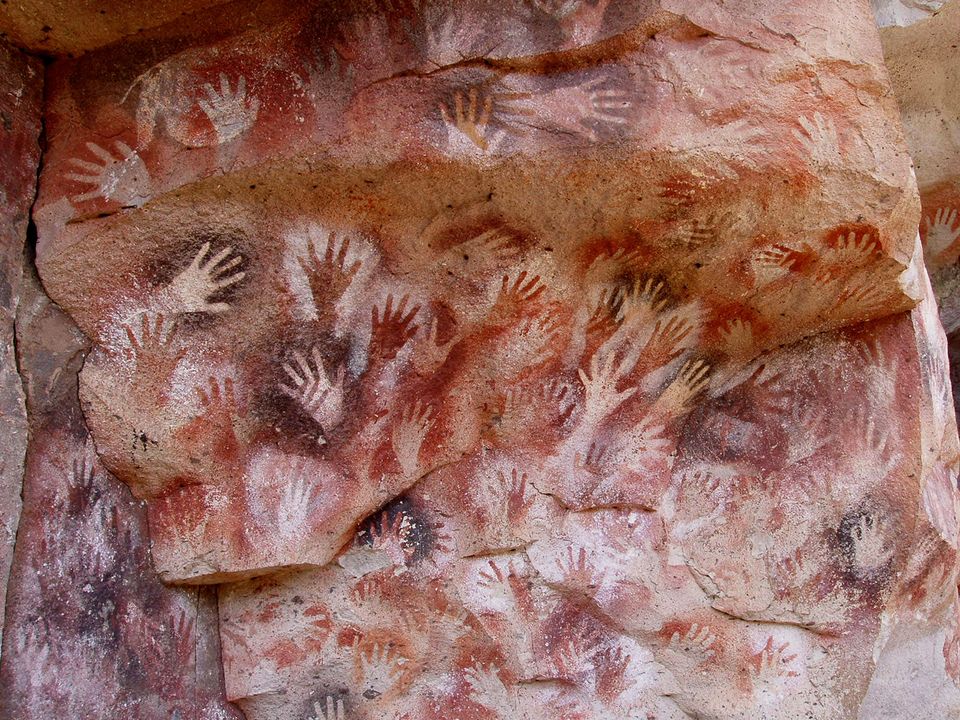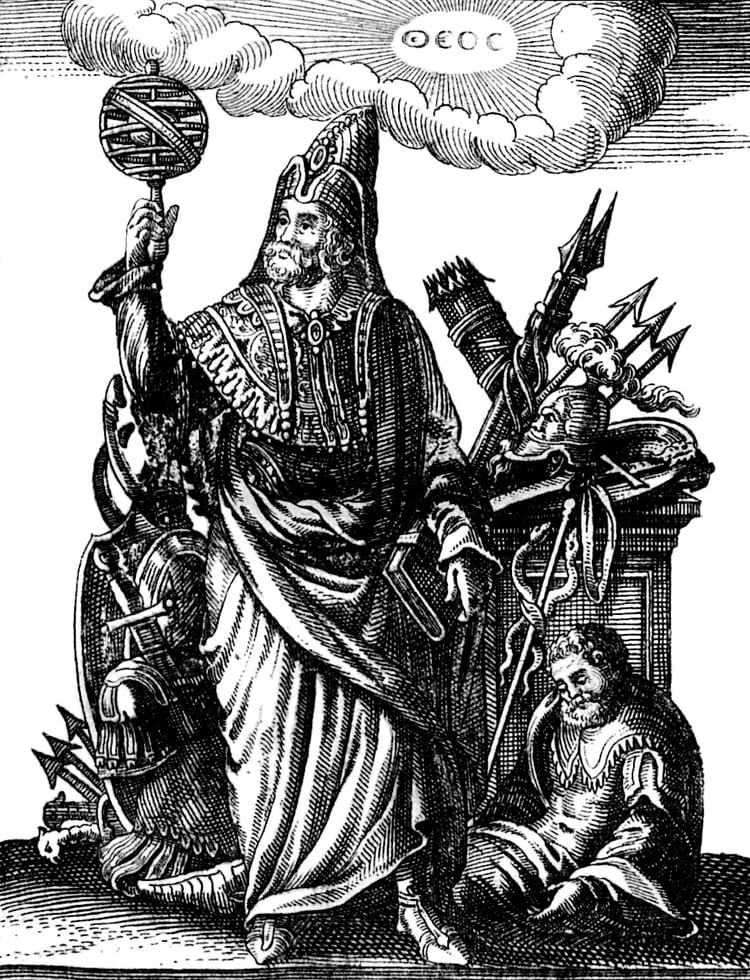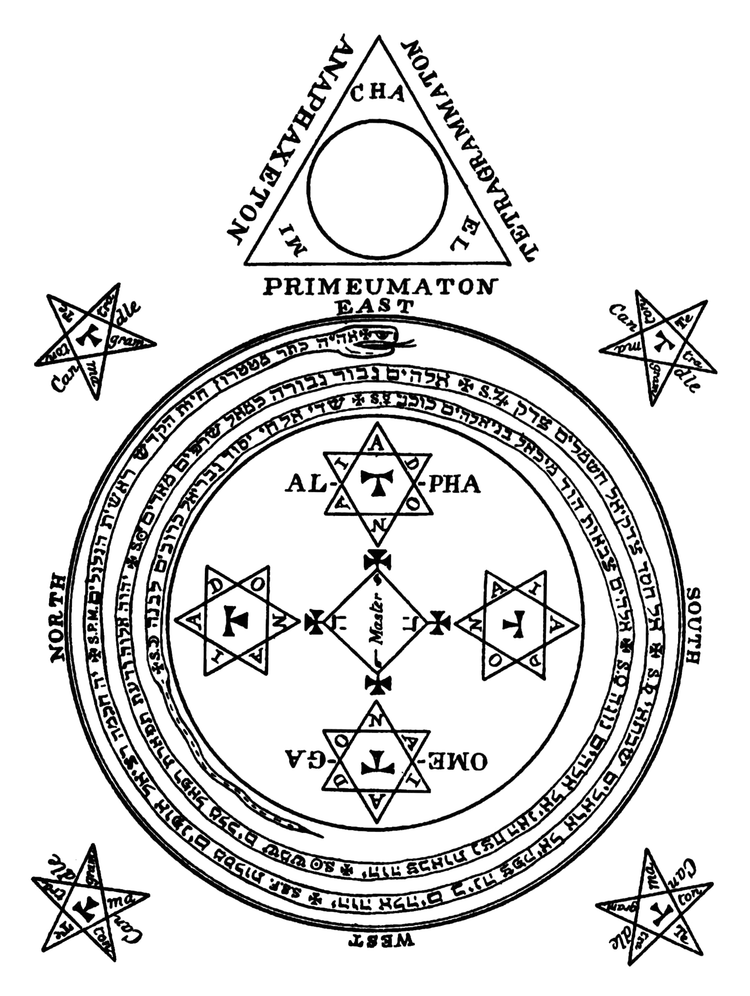New Moon: Consciousness, collectiveness, custodianship

Hello. It's Friday, and this week has been an extreme weather hell in my region, which isn't even over yet, but I have the reprieve of getting to write these thoughts today. I've been looking forward to it for a short while.
That was not the case right when I first realized, many months back, that at some point I would need to write something here about "the mystery of consciousness," as a starting point for later considering the mechanics of ritual, including what people mean when they talk about magic. I already knew I wanted to focus minimally on consciousness' what or how: though I partially focused philosophy of mind in college, nowadays I think that trying to qualitatively describe consciousness, or asking how much conscious experience overlaps reality, are not very useful discussions if we can't address why any life form should necessarily be conscious of the world around it in the first place. If there isn't a good reason, then our supposedly conscious experience might as well be a self-reinforcing delusion, and there's no point in interpreting it any further. However, despite thinking that far ahead, I originally suspected this post might become painfully dry — because in the analytical language I'm used to for philosophy, asking why are we conscious? can veer quickly into abstractions that only the very pedantic might care to read.
I would rather explore why are we conscious? through something more tangible. As luck would have it, over the past few months I've read some new books, and two of them have provided exactly the kind of earthy, earthly material that should help me form a why for our consciousness in very plain language. So for the first time in Salt for the Eclipse, I'm going to attempt a pair of book reviews — and my own conclusions will follow.
The Dawn of Everything, by David Graeber & David Wengrow
This book was released in 2021, posthumously in David Graeber's case. As I raised my partial progress through this book in an earlier post, I'm repeating myself slightly, but Graeber died in 2020 with an official cause of necrotic pancreatitis, and the much speculated unofficial cause of "asymptomatic" covid complications; whatever the case, before this immense tragedy he was a giant of iconoclastic, anarchistic economic theory and genuinely worthwhile anthropological analysis. I've been an admirer ever since reading his Debt: The First 5000 Years. So I came into this newer work with a bias. Nonetheless, The Dawn of Everything exploded all my expectations, because I thought I was going to read a book that simply pieced together overlooked data to address what freedoms and advantages prehistoric humans traded off in the process of "civilizing" — and what I read instead was a book that utterly reconfigured my understanding of how humans think and how our societies have evolved.
Even to say that sounds like the start of a dubious YouTube video, of course. Unraveling lies that a socioeconomic system is built on, uncovering the "real" nature of humanity, destroying conventional wisdom about global technological developments, etc., can imply a conspiracy where none exists; and for the skeptically minded, "extraordinary claims require extraordinary evidence." So as a caveat, I will say that Graeber & Wengrow sometimes offer speculations that I don't think should automatically be interpreted as hard and fast, evidence-based truths, because the proof is a little lacking, which they acknowledge. They only venture certain hypotheses in order to suggest possible alternatives to the standard-issue theories that they've dismantled.
But that is the key to appreciating this book: it never goes the cultish route of saying, "Everything you thought you knew was wrong, and here's what's right," only, "Everything you thought you knew was wrong, and that's fertile ground for drawing new conclusions instead." And as the authors do show with admirable scholarship, time and again, most of the old ideas they're tossing out the window are themselves extraordinary claims, and the evidence for those is shockingly, embarrassingly absent.
So what precisely have Graeber & Wengrow torn apart? The following is only a short sampling of what could be a much longer list.
- The notion that political discourse about freedom and human rights originates primarily in Europe
- The notion that in a "state of nature" humans always follow identical patterns of societal formation
- The notion that hunter-gatherer societies who discovered agriculture immediately and irrevocably adopted agrarian lifestyles
- The notion that all agrarian lifestyles necessarily demanded a loss of autonomy and the creation of imperial states
- The notion that "pre-civilized" cultures can't and haven't had immensely well-regulated and equitable communities
- The notion that patriarchy is the "natural" state of human affairs, though likewise the recent counter-notion that "primitive matriarchy" preceded it
- The notion that democratic, well-organized societies can't reliably scale beyond about a hundred-person tribal unit
- The notion that human intelligence improves with proximity to technology and "civilization"
It's difficult to explain each of their arguments without having to walk through each study, find, and citation that the writers themselves use, but in loose summary, all of the above notions and more are attacked and deconstructed through examinations of tens of thousands of years of archaeological data and historical documentation, concentrating especially on past and present indigenous populations, and on ancient empires far beyond and before Rome (though Rome features in some crucially negative ways). The colonial gaze remains insofar as these are white anglophone anthropologists doing the work, but they neither exoticize nor fetishize their subjects; non- or pre-Western communities are examined without being held up as "special" moral paragons, and the analysis simply supports a view of human political and technological development that is diverse in every possible respect.
If Graeber & Wengrow have one truly core argument to which most of the others might be reduced, it's that nothing has been inevitable, with the followup that contemporary industrial civilization is bizarrely, improbably locked in place; Margaret Thatcher insisted there is no alternative to extractive capitalism when in fact for most of human history there have been alternatives all over the place and we have often changed our societies quite rapidly and radically when the need arose. Marx's dialectic of history is also turned inside out, insofar as we could still look to Marx for a theory of how feudalism birthed capitalism, how capitalism might birth socialism, and so on, but if you started human development over, there are no guarantees that things would play out in the same order.[1]
Some of the cases that this book discusses at length will stick with me for a long time, maybe forever. For instance, there are the Nambikwara people of modern Brazil who traditionally changed their social governance with the seasons, nearly dictatorial in the dry months and extremely cooperative in the rainy months; dry season meant having to forage for food, with small broken-up bands being led by annually-selected but absolute chieftains, whereas rainy season meant horticulture was possible and chieftains' authority was no longer in effect. This has been paralleled by other tribes worldwide, though sometimes inverted, as groups might instead envision central authority as better during times of feast than famine, and prefer to share responsibility around more when times got hard.
Kings, or whatever related term we might want to use, thus have a genuine anthropological precedent as seasonal quasi-deities; in retrospect, The Golden Bough and subsequent neopagan/occult "king for the day" language, exemplified in The Wicker Man, could actually be more correct than historians used to give credit. Likewise, the temporary, conditional power transfer behaviors at play here have enormous implications for the way we position modern consent culture, which I'm going to come back to in another post.
And these are still only some societies of yesterday and today. In another instance, Graeber & Wengrow contrast the Yurok tribe of present-day California and the neighboring tribes of the Pacific Northwest coast such as the Kwakwaka'wakw, Nuu-chah-nulth, Haida, and Tsimshian: as the Yurok traditionally valued freedom from all obligations to other people, they had an ethos of self-sufficiency, austerity, and a highly transactionalized system of relations that came close to Eurasian currency models; meanwhile the Northwest coastal tribes had no such compunctions, and managed their much more communal potlatch gatherings with huge, competitive displays of abundance and excess, matched by elaborate kinship networks.[3] These communities lived near each other for untold generations; Graeber & Wengrow ask why they would be so culturally distinct. The most likely conclusion they reach is astonishingly straightforward and also relevant to modern times: when humans don't like what other humans are doing, we have a tendency to aggressively define ourselves in opposition to those other people, intentionally developing more of the traits that we view as superior. As it happens, the Kwakwaka'wakw and their cultural relatives historically had a slave-driven economy[2], and the Yurok who had perhaps once been victims were later opposed to slavery, so they chose to structure their own society differently — going to such an extreme that any sort of dependency between people was often rejected.
Those are only tribally-oriented examples. I almost don't know what I could pick from the empires that are covered — as well as the complex civilizations that can't really be described as empires. For this I will simply say: read the book. It is crammed with evidence of large settlements without centralized leadership or even any obvious class/caste stratification, often in places that didn't have writing systems. Where the agricultural angle is concerned, I was joyously overwhelmed by all the situations in which people seem to have developed farming but didn't tether themselves to it completely — doing something closer to gardening while they also continued hunting and foraging, and not even sticking to permanent housing in the process, as they might move to other parts of the region season by season and circle back to where they planted certain crops when the crops were ready.
It's not only the kind of thing that many surviving indigenous groups practice today, but it's what the ancestors of many de-indigenized peoples also once did. My heart soared to read of these things and to see them mapped into the realm of totemic clans spanning entire continents. A person of linguistic-cultural tribe X with membership in a clan of, say, salmon wisdom could nomadically traverse thousands of miles and come into contact with other salmon clan members of separate linguistic-cultural tribe Y, and be welcomed with symbolic kinship ties despite otherwise having wildly different customs.
By the end of the read, one more thing is very clear besides the non-inevitability of our politics: humans are exactly as intelligent now as our ancestors were tens of thousands of years ago. I came away feeling as if my longstanding fascination with early humanity could have more dimensions than I realized: it's not only that something cosmically massive was happening as we first engaged in simple tool use, fire making, and ritual. It's also that as far as we've come technologically, our conscious experience is probably the same, and our deepest instincts are too. And this brings me to the next book.
Sand Talk, by Tyson Yunkaporta
For a long time, I didn't like podcasts because even if I found one whose subject matter really interested me, my kind of autism has made me too textual and visual, reliant on seeing someone's mouth move if I'm going to absorb their spoken words. Audiobooks are even worse when they're just one person reading and reading and reading. This doesn't mean I feel no enjoyment when listening to other people talk for a while — only that I cannot have distractions, so the way I'm sometimes exhorted to listen to something if I don't have time to read it feels very off-putting, because I have to make time to listen to an audio recording, as much as making time to read, and I read incredibly fast. In any case, however, I've started finding contexts during my day where I'm not engaged in anything very mentally involving and where I do want to hear words of wisdom from interesting people: thus I've slowly been adding some good non-fiction podcasts to my life. Through one of these this summer I found Tyson Yunkaporta, and I'm eternally grateful.
Who is Yunkaporta? His standard biographical copy typically states that he's an Aboriginal academic, art critic, and woodworker who belongs to the Apalech clan, an indigenous community on the far north coast of colonial Queensland, Australia. But these qualities in and of themselves were not what drew me to his work. "Listening to indigenous voices" is a concept that I feel even highly anti-colonial settlers struggle with, and that I used to struggle with as well — there's this temptation to just listen to what "indigenous reality" is and to imagine you will remain forever outside of it, that you should admire their cultures but see them in terms of specific tokens and language that aren't transferrable to your own context. Even if you overcome that problem, it's also tempting to wait, penitently, for an indigenous person to simply tell you "what to do" and then it will be a basic instruction that you can just follow and purge your settler guilt. Compared to this, from the first time I encountered Yunkaporta's own voice, I believe he's adamantly expressed a truth that he has a distinctly powerful gift for relaying: the point of listening to indigenous voices isn't to ogle or mirror the exact substance of what they're telling you, but to learn the way that this person you're listening to thinks and how this mediates what they're saying.[4] Go beyond vocabulary, and into grammar.
This makes any interview with Yunkaporta — any yarn, which is an important concept I don't have space to fully unpack here — instantly refreshing, eye-opening, ear-opening, because he refuses to give easy answers to the hard questions but it also never feels like he's simply losing patience with the whiter, more colonized people that he often talks to. He's adept at translating an indigenous model for something into English without diluting the underlying ethos; and he's passionate about studying settlers from his own perspective, which means he can say straight, "I have a diagnosis for one of your problems, and here's a way to change your thinking in order to overcome it," rather than torturously putting his own culture on display and expecting us fools to know what to make of it. By his own admission, he's no tribal elder, only a conduit for relaying things he's learned from his own elders, but he's doing incredible, staggeringly difficult work, and somehow he's managing to do it while remaining a witty, down-to-earth, generous conversationalist.
So after just a few listens, I decided to read his 2019 book, Sand Talk, subtitled How Indigenous Thinking Can Save the World. On the one hand it's instantly apparent that the subtitle is some kind of publisher imposition that Yunkaporta is far too self-deprecating to happily tolerate; but on the other hand, this book accomplished what I would consider about five years' worth of deprogramming many of my deepest-entrenched lingering settler-isms, in only the five day span that I took to read it. I hope I know better than to say that I can already feel myself "thinking more like an indigenous person," but that's not just a matter of avoiding hubris — as Yunkaporta argues repeatedly, "indigenous thinking" is just innate human thinking, which in a colonial, industrial context is typically twisted by memetic viruses that make us fallaciously imagine we're supposed to be in an extractive, entropic relationship with the Earth (and each other) instead of in a balanced, cyclical relationship. Perhaps it would be accurate to say that reading Sand Talk has helped realign my mind with what I've always known.
This knowledge is encoded in our bodies, and in turn Yunkaporta offers physical exercises to either reinforce it or awaken it. I do not think someone will get the same benefit from this book without this kinetic, haptic component: through one exercise I feel myself having much more deeply realized the fractal layers of our intraconnected, relational cosmos, compared to if I had simply read the philosophical words. Whenever I wish, through touch I can now return to an ingrained principle of reality — that anything we might need to understand about love, balance, justice, dependence, and responsibility is found equally on the small scale of parent and child all the way up to the mysteries of our stardust ancestors. I've started to feel connected to things, at peace with things, healed from things, in ways I once thought were impossible, and it started with talking to my own hand.
That wasn't too far into the book. Near the end, I experienced something that I can't even find words for. It happened through a guided meditation that I think either Yunkaporta recommended reading aloud or that I felt moved to read aloud anyway; guided meditations can stray into vapid New Age territory, but they can also be powerful tools, and the vapidity depends on the language chosen and the ethos of the person who crafted it. In this instance, I won't quote directly — I would rather have other people buy the book or find it at their library — but I hope that my established aversion to fluff can be trusted when I say this is no fluff. The journey taken in this meditation is not harrowing, quite the opposite, but to undergo it felt actively sacred. And as I read along, I unlocked something. "Ego death" would be too intense, trendy, and abused; a closer phrase might be "identity collapse" as I stayed within my body but found my personhood permeable with others'.
At first, I'd been reading the words with my own voice, but partway through, I instinctively shifted my accent and couldn't seem to revert from it. I had heard Yunkaporta's voice just enough that I knew I was speaking like him, heavily Australian. It wasn't that it felt necessary to "become" the Aboriginal writer who wrote these words, but rather that I connected so precisely with what he was saying that the way to most fully encounter the words was to hear them in the air around me like he spoke them. But then — closer to the end, my voice shifted again. Now it was a Cymric accent, a Welsh accent. It was an ancestor's voice, as if it wasn't enough to simply absorb this meditation as wisdom from another culture, but to hear it as a universalized revelation from some of my own people.
Ever since then, I haven't quite known what to make of that reading. Was it right for me to experience an act akin to ancestral possession when I was encountering something crafted by an indigenous author? Despite all my careful striving for the last 10-15 years to avoid "playing Indian" or fantasizing about being granted magical indigenous kinship tokens, in those strange moments the other week did I still thoughtlessly try to wrest control of this wisdom?
I feel most instinctively as if the answer there is no, because throughout the book, Yunkaporta urges readers to adapt anything he's saying for their own context; perhaps that's exactly what I did. But I'm still fallible enough that I'm sure I could have interpreted this the wrong way. I'm almost tempted to write him and ask, if he isn't beleagured by getting too many similar questions from other strangers.
Be that as it may, Sand Talk altered me, even if it didn't change my consciousness so much as lift veils away from parts of it. I am also now so invested in hearing what else Yunkaporta has to say that I've been listening to his own podcast, which is a mesmerizing experience considering the breadth of guests he's had. I'm cautious of becoming too reliant on his work — he is just an ordinary person, and I try to temper my relationships with guru-like figures even when I love everything they're saying — but I'm at least feeling voracious about it, and I'm going to absorb and interpret everything I can until I feel ready to progress even further with some other source of learning.
In the meantime, Sand Talk followed perfectly on The Dawn of Everything because of how in explaining our most instinctive human thinking it affirms how brilliantly we can think when we aren't constrained by industrial age narratives about progress and conquest. Although in our most self-centered moments our species has been responsible for great harm to our ecosystems — prehistoric megafauna extinctions set a wretched standard — our gifts and abilities also carry the potential for helping the land and sky to flourish more than they would without us. We can enrich as a custodial species, and we do this by being meaning-makers, the fillers of the spaces between the nodes.
Yunkaporta is hardly the first voice to say this, as I've encountered it from many other indigenous people and it's also a call that's been taken up by non-indigenous environmentalists and ecologists. But so far Yunkaporta has articulated an angle to it that I've missed before, which might say as much about my own ignorance in the past as it says about his communication skills. The angle is: to even speak of living harmoniously with nature is to miss the fact that we are not separable from nature at all. Our very existence is defined by our function within nature, and our (spi)ritual, psychological, and physical health is maintained through staying in good relation with the other pieces of nature around us. We are a particularly social species because as we foster better relations with each other it also teaches us to foster better relations beyond ourselves. We share knowledge and cognition together, and we can tend other species by relating to them and learning what they need.
The necessity of perception
As to whether other species are conscious in the same way as us, that's a mystery for a later time. Consciousness need not be the same thing as animacy, or if it is, it may be as qualitatively different from species to species as our different languages are.[5] But as for why we, humans, are conscious, I want to take everything I've said above and lead to what feels like an effortless conclusion:
Suppose we are indeed natural collective-builders and ecological custodians. I believe we could not do those things if we didn't have some experience of perceiving reality, instead of being mere automata.
It doesn't matter how accurate that perception is, and it doesn't matter what that perception is "made" of, and it doesn't even matter whether we experience our perceptions in the same way as one another. What matters is that we have the perceptive experience at all, and that this tells our cognitive faculties that there is something worth having cognition about. Only by that reflexive, self-reinforcing feedback loop can we generate the requisite creativity for complex social and ecological interactions. We must actively examine reality in order to alter it — to resolve quantum ambiguities on a grand scale — and so we must be under the impression that we're examining anything.
We are conscious because a purely mechanistic, consciousness-less mind would not enable us to act the way we do and fulfill our role in the cosmos.
I've written a lot of words to reach such a brief conclusion, but there it is. So much philosophy is smoke and mirrors — no sense in dragging out my thoughts when they can come together at the speed of light. I will write more about the what and how of consciousness as outgrowths of this post, eventually; it would be a miraculous achievement to answer, for example, whether consciousness does persist after death or occur in inanimate things, but I have to at least meditate on those mysteries periodically. In the meantime, however, the why is set out before me. The why of consciousness regards our collective, custodial duties.
So now: to our duties.
[1] Unsurprisingly, I believe that the Marxist-Leninist to tankie continuum of pseudo-communists is not so fond of this book, but the anarchosyndicalist movement to which Graeber (an IWW member) belonged has never had a warm relationship with those people, and between myself and many other anarchists I've known we feel free to pick and choose the wisest parts of Marx without turning his work into dogmatic scripture. It's very ironic when the tankie crowd calls anarchists "children," given the stunning intellectual immaturity of thinking that recitation of written theory is the same thing as understanding how the world works — especially when the same mindset has led to someone claiming anti-imperialism and supporting indigenous land rights but thinking the largest "communist" states occupying hundreds of thousands of acres of indigenous territory is perfectly all right.
[2] Not equivalent to colonial-era chattel slavery, and arguably an ethically complex situation, but slavery nonetheless.
[3] The writers do not fully endorse the Protestant vs. Catholic analogy put forward by a fellow anthropologist, but I agree with their opinion that this is potent imagery for anyone who's read Max Weber's The Protestant Work Ethic and the Spirit of Capitalism.
[4] That said, it's certainly still important to listen closely to the substance of what indigenous peoples of the land you're on have to say about how the land works. But I do not live on Apalech land or any Aboriginal land, so there's no reason for me to want someone like Yunkaporta to teach me the plant medicine of his country, and indeed I think he's rather exhausted by such things — whatever plants he could tell me about, I'm usually not going to find them here.
[5] The US linguistics community loves to bury their heads in the sand on this, but I am an advocate of animal language theories based on both common sense and scientific research.
Thank you for reading. I am not completely certain this book review format worked, but if I have another book to review in the future, I'll see what I can do. Next week: tree lore for Haust Blót (my observance of the autumn equinox). And the week after that will be some more astrolomy, this time focused not on astrology but on constellations beyond the zodiac.





Member discussion